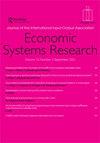Large-scale multinational shocks and international trade: a non-zero-sum game
IF 1.6
4区 经济学
Q2 ECONOMICS
引用次数: 1
Abstract
International trade has improved living standards but has also become a major channel for spreading shocks on a global scale. The increasing relevance of intersectoral linkages and trade in intermediates renewed interest in input–output techniques. This paper enriches the literature on empirical trade models with an input–output/econometric approach including substitution effects and price spillovers. Our model shows that (a) trade elasticities and bilateral shares are not constant in time and differ across sectors and countries; (b) international price changes alter the relative competitiveness between competitors; (c) final demand components such as consumption and investment react to changes in international prices. Large multi-country shocks produce feedback effects in national economies as they adapt by import substitution across exporters, by changing the import content of domestic production and by adjusting final demand. These feedbacks affect the global demand producing an asymmetric non-zero-sum game.大规模跨国冲击与国际贸易:非零和博弈
国际贸易提高了人们的生活水平,但也成为在全球范围内传播冲击的主要渠道。部门间联系和中间产品贸易日益重要,重新引起人们对投入产出技术的兴趣。本文运用投入产出/计量经济学的方法,包括替代效应和价格溢出,丰富了实证贸易模型的文献。我们的模型表明:(a)贸易弹性和双边份额在时间上不是恒定的,并且在部门和国家之间存在差异;(b)国际价格变化改变了竞争者之间的相对竞争力;(c)消费和投资等最终需求组成部分对国际价格的变化作出反应。大规模的多国冲击在国家经济中产生反馈效应,因为它们通过出口国之间的进口替代、通过改变国内生产的进口内容和通过调整最终需求来适应。这些反馈影响了全球需求,产生了一种不对称的非零和博弈。
本文章由计算机程序翻译,如有差异,请以英文原文为准。
求助全文
约1分钟内获得全文
求助全文
来源期刊

Economic Systems Research
ECONOMICS-
CiteScore
5.60
自引率
4.00%
发文量
17
期刊介绍:
Economic Systems Research is a double blind peer-reviewed scientific journal dedicated to the furtherance of theoretical and factual knowledge about economic systems, structures and processes, and their change through time and space, at the subnational, national and international level. The journal contains sensible, matter-of-fact tools and data for modelling, policy analysis, planning and decision making in large economic environments. It promotes understanding in economic thinking and between theoretical schools of East and West, North and South.
 求助内容:
求助内容: 应助结果提醒方式:
应助结果提醒方式:


